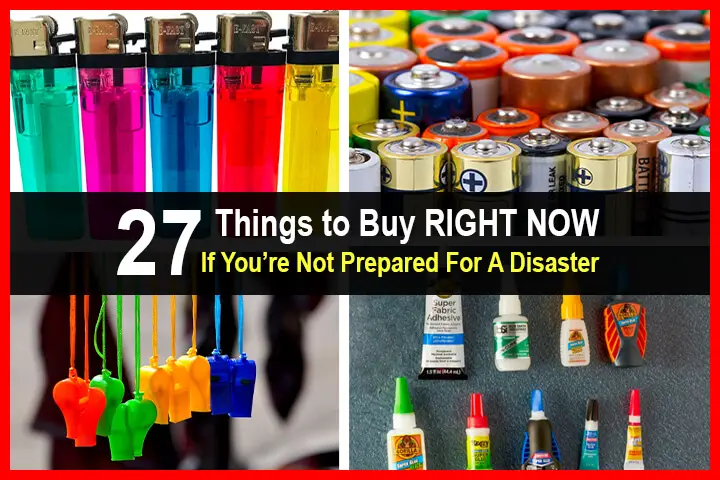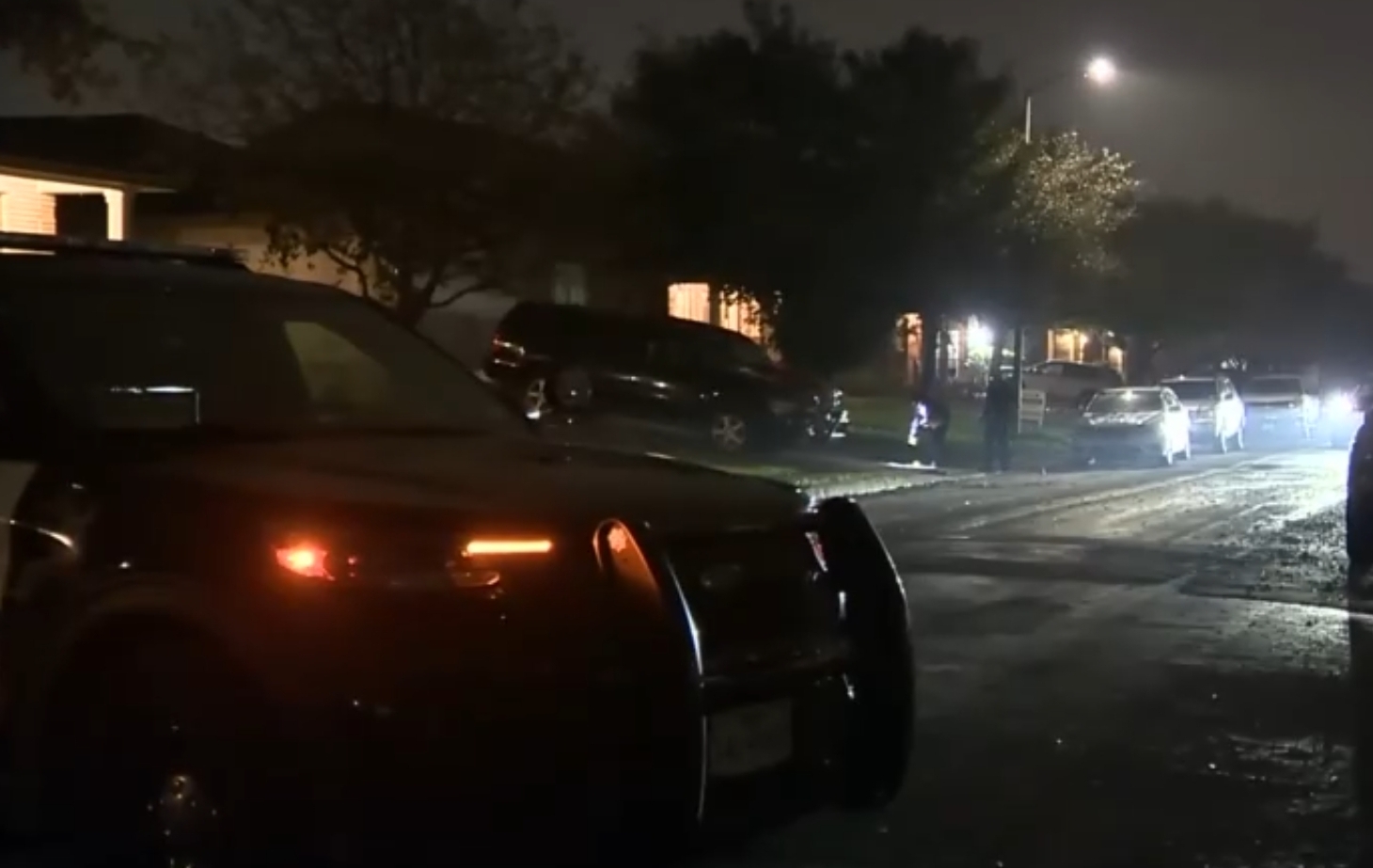Estimated reading time: 10 minutes
You’ve got 2 hours until disaster strikes. Are you prepared?
If you’ve watched any apocalyptic movie ever, you’re familiar with the grocery store scene. You know which one I’m talking about. Anxious dad rushes isle by isle gathering water and canned food for his family while everyone around him gradually turns from innocent customer to aggressive looter.
In this scenario, shelves are emptied quickly, and the store turns into a war zone. In the next scene, dad finds a store that has managed to keep control of their stock but has become absurdly greedy, inflating prices and heartlessly bartering family heirlooms in place of the now useless cash.
Sounds fun, doesn’t it?
If you think this scenario can only play out on the big screen, think again, pal. Just the whisper of disaster is enough to throw your whole neighborhood into a frenzy – because guess what, no one is prepared for a disaster. No one has stocked up on window reinforcements or food rations. No one has thought about how to protect their family or home. No one is ready, and now they’re panicking to the point of hostility.
As you’ll see in this minimalist disaster survival list, you can prepare for a disaster with low-cost supplies and limited storage space right now. Every purchase on this list is quickly accessible via a 2-day Amazon Prime order or a speedy run to your local Walmart.
Want to save this post for later? Click Here to Pin It On Pinterest!
How fast can you collect them all?
Resources
1. Batteries
What help is a flashlight or hand radio without any juice? Give yourself some extra insurance by purchasing a variety pack of batteries instead of a standard pack. You may think that you know which battery every device requires, but there’s always that one gadget with unreasonable standards.
2. Candles
What’s the first thing you do when the power goes out? Light the candles, of course. But what if the power is out all night? Or all week? You’ll need candles that burn up to nine hours. If you can’t find these in the store, get the tallest and thickest candles you can find on the shelves – don’t bother with tea light candles!
Related: 11 Ways To Light Your Home When The Power Goes Out
3. Flares and Smoke Flares
In the case of a flood, rescue workers will eventually row from house to house, checking for stranded families. Speed up the process by drawing attention to your home with a simple flare gun.
4. Lighters
Don’t even bother with matches from your local hardware store. Pick up a dozen BIC lighters and keep them somewhere dry.
Related: 15 Weirdest Ways To Start A Fire
5. Map
Grab a paper map of your city. If a disaster knocks out your power (which it will), you’re quickly going to realize just how dependent you’ve become on GPS. Back to the basics, you’ll need to keep track of the unsafe zones on your map as navigate yourself out of the city or towards the nearest remedy.
Related: 8 Maps You Should Have In Your Bug Out Bag
6. Whistles
Another attention-getter. Either alert rescue crews of your location or find your way back to your tribe if separated during a journey.
7. Ziploc Bags
A hurricane, flood or typhoon will ruin your electronics and family mementos by submerging them or covering them in condensation. Double Ziploc anything and everything worth value to you.
Related: 15 Survival Uses For Ziploc Bags
8. Battery-Powered Flashlight and Lantern
Small, compact, and easy to repower when a disaster creates a power blackout, every home needs a battery-powered flashlight and lantern. You can walk into any home goods store and find a collection of flashlight + lantern gadgets. Make sure to get an LED flashlight; these shine brighter in the dark.
9. Fire Extinguisher
So, the disaster has left you with no source of light or cooking, right? Now you’re using candles that you don’t usually use and cooking with methods that you haven’t practiced with often. An accidental fire would not be a huge surprise under these circumstances, right?
Don’t make your situation any worse with a house fire. Keep your extinguisher handy and learn how to use it right when you buy it.
Related: How To Choose And Use A Fire Extinguisher
10. Gun
Hey, if you’re near a Walmart and have a permit, you can be in and out of the store with a shotgun in 20 minutes.
Related: 6 Survival Guns You’ll Need After The End Of The World
11. Hand Crank Radio
When signals are down and the internet is a distant memory, a hand-crank radio keeps you connected to the world. This little device can be a source of weather updates, emergency broadcasts, or just a comforting voice in the dark. It’s powered by good old-fashioned elbow grease, meaning as long as you can turn a handle, you’re in tune with what’s happening out there.
12. Multi-Tool
In the world of disaster preparedness, versatility is king, and a sturdy multi-tool is the Swiss Army knife of survival. From tightening screws on your makeshift shelter to opening cans or cutting through materials, this compact toolkit can tackle a plethora of problems without taking up much space. It’s like having a hardware store in your pocket.
13. Solar Charger
Even if the power grid takes a vacation, the sun isn’t going anywhere. A solar-powered charger can be your lifeline to the outside world, keeping your phone and other small gadgets charged. Perfect for when you need to call for help, check in with loved ones, or just distract yourself from the chaos with a game or two. Don’t let a little thing like a blackout cut you off from civilization.
14. Water Filter
Sure, you’ve stockpiled water, but what happens when you’re running low and the taps are just as dry as your humor? A portable water filter becomes your best friend. Whether it’s a LifeStraw or a more elaborate filtration system, being able to turn dubious water sources into drinkable H2O is practically a magic trick in a disaster scenario. It’s the difference between hydration and desperation.
Related: 15 Ways to Purify Water in a Survival Scenario
15. Wrench
When a lightning storm hits, you want to unplug your electronics. Similarly, when a natural disaster hits, you want to shut off your utilities. Specifically, gas lines and water pipes. Explosions and flooding are not uncommon in these situations.
Home Reinforcements
16. Caulk
A wet or cold disaster can damage the inside of your home within hours. Use the caulk to plug any holes or fill any gaps you can find on your windows and doors. Essentially, you want to create the warmest and driest conditions possible. This means that you might also consider using caulk where caulk doesn’t usually go, like the base of your front door.
17. Duct Tape
The ultimate accessory for emergency repairs! Seal windows, stop leaks, and hell, even put your car back together long enough to get out of dodge. Duct Tape is the #1 disaster accessory that you should be storing under the kitchen sink. Grab as much as humanly possible.
Related: 47 Survival Uses For Duct Tape
18. Hammer, Nails, and Plywood
Hurricane on the horizon? Zombies looking for dinner? Reinforce your windows ASAP. If the exterior of your house is lined with siding, plywood boards can easily be nailed on to securely cover your windows.
Live in a tall apartment block? Here comes that duct tape again! Nail some boards together and then secure them over your windows from the inside.
Related: 18 Home Repair Supplies You Need To Get In Case Of Disaster
For the Humans
19. Condoms
What else is there to do during a blackout or blizzard? Although there aren’t official stats of how many babies have been conceived in these scenarios, we can unofficially assume that disasters double as baby makers.
Related: 20 Survival Uses For Condoms
20. Feminine Supplies
No showers mean poor hygiene, especially during that time of the month. Stock up on tampons now, or even better, convert to the Diva Cup which is infinitely reusable.
21. Heavy-Duty Blankets
Whether you are tucking in for a weekend of snowstorms or expecting a full-on apocalyptic blizzard, you’ll need blankets that will help regulate and/or stabilize your body temperature. You can go with Military-grade wool blankets that keep you warm even when wet or a simple down comforter that you can find in any superstore or department store.
22. Medical Kit
Every home needs a medical kit, and odds are that you already have one. What most people forget, however, is that a medical kit doesn’t update itself. You need to check the expiration dates on your Neosporin and make sure that you haven’t used all the Band Aids. Pro Tip: Stick an Epi Pen in there for good measure.
Related: How To Build An Emergency First Aid Kit From Scratch
23. Mylar Blankets
In cold weather disasters, a thermal mylar blanket is an essential survival tool. Designed to retain up to 90% of your body heat, these compact, lightweight blankets can be a lifesaver, offering warmth, shelter, or a reflective signal for rescue. Foldable to fit in the palm of your hand, they embody efficiency and versatility.
24. Non-Perishable Food
You don’t know how long the aftermath of this disaster will last, so when collecting food, you want to get food that won’t spoil quickly, doesn’t need refrigeration, and can be eaten without cooking or heating.
While you want to make sure you collect food that will provide nutrients and sustenance, having some morale-boosting snacks will do wonders. Think “chips and salsa” or some Snickers.
Related: Beginner’s Guide To Emergency Food Storage
25. Super Glue
We all know that super glue can be used to temporarily bond wood, metal, and plastic… but did you know that you can also use super glue to close a minor wound? If a shard of glass slices your finger during a disaster and you’re not able to get to a hospital, temporarily close your wound with super glue.
Don’t use glue on deep wounds, near your eyes, or as an everyday fix. But when you’re in a bind, this will stop the bleeding and help protect from infection.
Related: 12 Surprising Uses For Super Glue
27. Toilet Paper
Admit it, you would’ve totally forgotten about this one if it weren’t for this list! This goes back to the hygiene subject. Never underestimate the physical and mental importance to keep clean hygiene practices, especially when living in close quarters with others.
Related: 15 Ways To Wipe Your Butt When The Toilet Paper Is Gone
27. Water
Rule of thumb: Humans require one gallon of water per person per day. This is both for drinking and sanitation. When disaster strikes, clean water is no guarantee. And without clean water, you are… well, doomed.
Related: 8 Places You Can Store Your Drinking Water
When a disaster strikes, the disaster isn’t your only threat. Your neighbors will turn hostile within hours and your thirst will turn deadly in ten days. You mustn’t fear the disaster as much as you should fear the aftermath and the repercussions of not being prepared.
There is no excuse NOT to be ready.
The only way to minimize these threats, fears, and dangers? To prepare now. Today. Again, everything on this list is available right now. It’s always better to have it and not need it than to need it and not have it.
Like this post? Don’t Forget to Pin It On Pinterest!

Read the full article here




